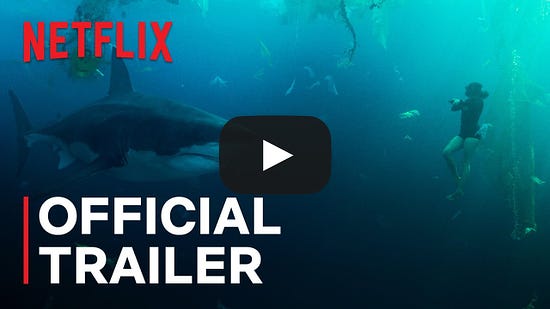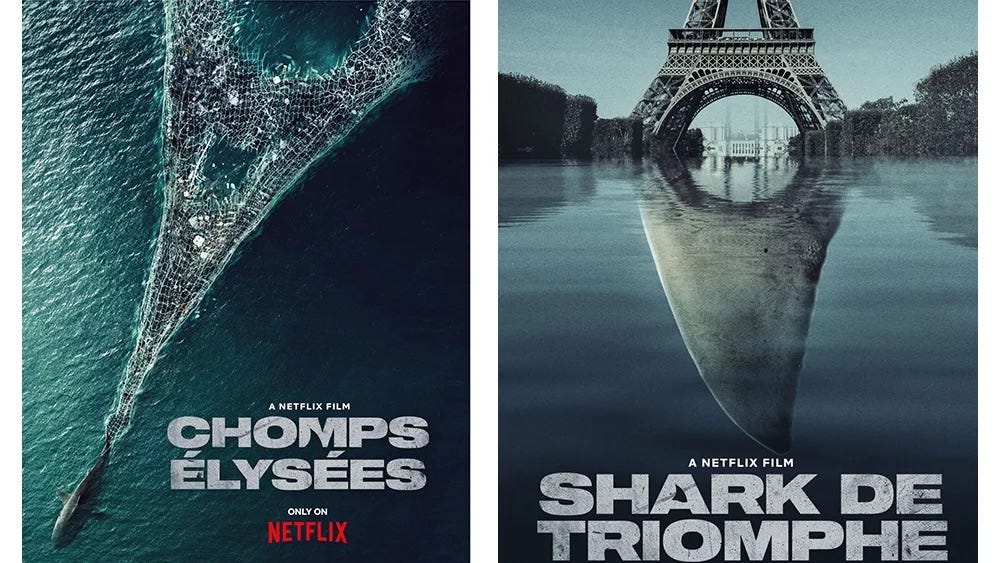What maniac jumbo sharks can teach us about climate change
Welcome back to HEATED—Arielle here. Today, I get to talk about the hot hit of the summer, a French film about climate-mutated sharks. (Seriously.) But this is not just a shark movie. It is also a movie that treats the climate crisis as if it’s actually happening, something that’s still rare in films. Last year, we met with filmmakers at the Hollywood Climate Summit who recognized the power of storytelling to inspire climate action. As I wrote after the event, Hollywood has a powerful influence on how we see the world because stories can alter our feelings, our beliefs, and even our brain chemistry. There’s clear demand for more climate stories like these. We recently surpassed 100,000 free subscribers, making us the most-read climate newsletter on Substack. But only a small percentage of readers are paid subscribers. You can help support our growth, and help us tell more stories like these, by upgrading to a paid subscription. Thank you! This article contains spoilers for the movie Under Paris. As thousands of athletes compete for a shot at the 2024 Paris Olympics this week, a new wildly popular Netflix movie is shining a light on the event’s struggles with climate change and pollution—albeit in the most absurd, blood-thirsty way possible. Under Paris, which had the most successful launch for a non-English language film in Netflix history, is both a genre thriller and a political satire in the vein of Don’t Look Up—except instead of a world-destroying comet, it uses homicidal sharks as its metaphor for a climate disaster that everyone in power is inexplicably ignoring. It’s the new, better-made Sharknado. (Or Sharknadeau, as NPR reviewer Linda Holmes dubbed it.)  The film begins with marine biologist and climatologist Sophia Assalas (Bérénice Bejo, from The Artist) tracking a mako shark named Lilith near the Great Pacific garbage patch, a real place in the Pacific Ocean polluted by 79,000 tons of plastic garbage. But much to Sophia’s surprise, Lilith has rapidly grown into a super-shark 7 meters (23 feet) long. When her team of scientists dive into the water to try to figure out why, Lilith eats everyone except Sophia. Three years later, a group of environmental activists alert Sophia that Lilith, a saltwater shark, is inexplicably swimming in the Seine, a freshwater river. Later, they learn the reason why: climate change and pollution have caused her to evolve and adapt to new conditions. Lilith’s presence in the river is incredibly dangerous, because in one week the Paris Olympics is slated to begin with a triathlon in the Seine. Under Paris goes on to follow all the good tenets of any good disaster movie. Scientists try to warn officials that Lilith is going to kill a lot of people; officials ignore them because they’re concerned about politics and finances; and a lot of people ultimately wind up dead. It’s the movie’s most accurate metaphor for how climate change is playing out today—but it’s not the only one. Lilith, of course, is completely imaginary; climate change is not turning sharks into freshwater-swimming, man-eating maniacs. In fact, in real life, scientists have found that the climate crisis actually makes sharks less likely to attack prey. But animals really are mutating because of climate change. Dark-colored dragonflies are becoming lighter to absorb less heat, and fish in warming seas have moved into deeper water. Researchers have even found that rising temperatures are changing how animal brains develop, altering their behavior at the level of individual neurons. While there are no sharks in the Seine in real life, the river does hold real threats to swimmers—who are actually expected to swim there for a triathlon and marathon in the 2024 Olympics. For one, there is so much pollution in the Seine that swimming in the river has been illegal since 1923. Real-life Paris Mayor Anne Hidalgo has assured people that the Seine will be safe to swim in because France spent at least $1.5 billion cleaning the river water. And yet, despite these efforts, recent tests showed that E. Coli levels are still three times higher than the standards set by World Triathlon, according to CNN. But pollution is not the main concern of the real-life athletes competing in the Paris Summer Games. It’s extreme heat driven by climate change. According to a report published this week by the British Association for Sustainable Sport (BASIS), Paris temperatures have risen 1.8 degrees Celsius (3.2 degrees Fahrenheit) since the last time the city held the Olympics in 1924. In the most recent Summer Games in Tokyo, which are the hottest Olympics on record, about 1 in 100 athletes suffered heat-related illnesses. One of those athletes was Russian tennis player Daniil Medvedev, who told an umpire: “I can finish the match but I can die. If I die, are you going to be responsible?” In fact, unlike the fictional triathletes in Under Paris, real-life Olympic athletes know how much danger they’re in from climate threats. “We do all get in that water knowing that people have died from the heat,” said Olympic marathon swimmer Amber Keegan in the BASIS report. “It's not something to be trifled with.” In Under Paris, the mayor is explicitly warned about the threat to swimmers from the man-eating sharks. “Your little PR stunt will turn into a massacre,” Sophia tells the movie-mayor, who bears a passing resemblance to real-life mayor Hidalgo. Hidalgo, too, has been warned about the threats, but she and Olympic officials have decided to press on. The International Olympic Committee (IOC) told Reuters that they had planned the competition schedule “carefully to prevent heat-related illnesses.” Specifically, local organizer Paris 2024 told NBC that they would offer free water, and that France’s meteorological agency would be part of the Games’ operation center, allowing for adjustments to the schedule. This is better than nothing, but it is nowhere near the seismic shift that experts say is needed to adapt to a rapidly heating planet. As temperatures continue to rise, athletes, sports fans, and workers are at risk for dehydration or heat stroke—one of the leading causes of sudden death in sports. Some sports organizations recommend that the Summer Olympics should be moved to a different time of year, or to cooler regions of the world that are less likely to experience extreme heat. It’s not just the Games either—all outdoor stadium events are in danger because of the climate crisis. Over the past 25 years, 68 American football players have died from heat stroke. During the 2022 World Cup, 400 to 500 workers died while building the stadium in Qatar’s extreme summer heat. And last summer, one fan died and thousands suffered from dehydration at a Taylor Swift concert during a heat wave in Brazil. “So far, the strategy around managing heat at big sport events and big festivals is to make sure the medical team is ready to hand out water,” Madeleine Orr, an assistant professor of sport ecology at the University of Toronto, told HEATED for our story on the deadly Swift concert. Instead, Orr said that organizers need clear guidelines on when to cancel events due to climate dangers. But seeing that the 2028 Games are in Los Angeles, California, where summer temperatures can rise above 100 degrees Fahrenheit (38°C), that’s not happening anytime soon. So far, officials are more comfortable setting carbon emission targets, and taking small steps that don’t drastically alter the incredibly lucrative sports world. That is not what happens in Under Paris, because that would be an extremely boring movie. Instead, the mayor calls the army, who shoot the sharks with machine guns. This is fun to watch, but ultimately useless, because the sharks have mutated into bullet-proof, bomb-proof machines of death. Right before all this goes down, Sophia tries to get the mayor to cut their losses. “Do you not understand what’s happening? A dozen dead, and it could be hundreds!” Sophia shouts at her. “You just have to cancel, it’s not complicated!” And that’s the beauty of disaster movies. In Under Paris, it’s obvious that the mayor should cancel or move the triathlon, instead of letting the athletes jump into the water like shark bait. But in real life, when the threat is climate change and pollution, billions of dollars, millions of viewers, and over a century of tradition makes things seem more complicated. So is it really that far-fetched that the Under Paris mayor is more concerned about money and media coverage than about people being eaten? The consequences of the fictional mayor’s decision are fatal and far-reaching. Sharks kill everyone except Sophia, who is left alone in a rapidly flooding city. The ending subverts the disaster movie genre; usually, the heroes find some way to survive in a changed world. Not this movie. As the end credits roll, a map shows sharks spreading from Paris to London, New York, Bangkok, Venice, Tokyo, and eventually, across the entire world. If there’s a lesson to be taken away from this, the movie tells you what it is right in the beginning. It opens with this quote: “It is not the strongest of the species that survives, nor the most intelligent. It is the one that is most adaptable to change.” The characters in Under Paris don’t adapt quickly enough. Hopefully, we fare better. Further reading:
Catch of the day: Readers Jeff and Kari just added a little addition to their family: Harriet, an Irish Setter/Doodle mix. Kojo, a Ridgeback, is being a very patient older brother as Harriet figures out how this whole leash thing works. Want to see your furry (or non-furry!) friend in HEATED? It might take a little while, but we WILL get to yours eventually! Just send a picture and some words to catchoftheday@heated.world. You're currently a free subscriber to HEATED. For the full experience, upgrade your subscription. |
Older messages
Trip balls, save the Earth?
Wednesday, June 19, 2024
I fell down the rabbit hole of Psychedelics for Climate Action. Then I came back to reality. ͏ ͏ ͏ ͏ ͏ ͏ ͏ ͏ ͏ ͏ ͏ ͏ ͏ ͏ ͏ ͏ ͏ ͏ ͏ ͏ ͏ ͏ ͏ ͏ ͏ ͏ ͏ ͏ ͏ ͏ ͏ ͏ ͏ ͏ ͏ ͏ ͏ ͏ ͏ ͏ ͏ ͏ ͏ ͏ ͏ ͏ ͏ ͏ ͏ ͏ ͏ ͏ ͏ ͏
How grassroots climate activists are taking on Big Tech
Thursday, June 13, 2024
In Virginia, a small conservation group is leading the fight against the powerful and secretive data center industry. ͏ ͏ ͏ ͏ ͏ ͏ ͏ ͏ ͏ ͏ ͏ ͏ ͏ ͏ ͏ ͏ ͏ ͏ ͏ ͏ ͏ ͏ ͏ ͏ ͏ ͏ ͏ ͏ ͏ ͏ ͏ ͏ ͏ ͏ ͏ ͏ ͏ ͏ ͏ ͏ ͏ ͏
If Trump can be convicted, so can Big Oil
Tuesday, June 11, 2024
Progressive prosecutors should be taking a more aggressive stance against fossil fuel companies, advocates argue. ͏ ͏ ͏ ͏ ͏ ͏ ͏ ͏ ͏ ͏ ͏ ͏ ͏ ͏ ͏ ͏ ͏ ͏ ͏ ͏ ͏ ͏ ͏ ͏ ͏ ͏ ͏ ͏ ͏ ͏ ͏ ͏ ͏ ͏ ͏ ͏ ͏ ͏ ͏ ͏ ͏ ͏ ͏ ͏
U.N. chief calls for global fossil fuel ad ban
Wednesday, June 5, 2024
The New York Times, one of the biggest purveyors of fossil fuel ads, did not respond to our request for comment. ͏ ͏ ͏ ͏ ͏ ͏ ͏ ͏ ͏ ͏ ͏ ͏ ͏ ͏ ͏ ͏ ͏ ͏ ͏ ͏ ͏ ͏ ͏ ͏ ͏ ͏ ͏ ͏ ͏ ͏ ͏ ͏ ͏ ͏ ͏ ͏ ͏ ͏ ͏ ͏ ͏ ͏ ͏ ͏
What is a “leftist climate scientist” president, exactly?
Tuesday, June 4, 2024
Mexico's first female president is not a Green New Deal-supporting radical—not by a long shot. ͏ ͏ ͏ ͏ ͏ ͏ ͏ ͏ ͏ ͏ ͏ ͏ ͏ ͏ ͏ ͏ ͏ ͏ ͏ ͏ ͏ ͏ ͏ ͏ ͏ ͏ ͏ ͏ ͏ ͏ ͏ ͏ ͏ ͏ ͏ ͏ ͏ ͏ ͏ ͏ ͏ ͏ ͏ ͏ ͏ ͏ ͏ ͏ ͏ ͏ ͏
You Might Also Like
March's Guest Editor: Kim Addonizio
Friday, February 28, 2025
Thank you for supporting Poem-a-Day ͏ ͏ ͏ ͏ ͏ ͏ ͏ ͏ ͏ ͏ ͏ ͏ ͏ ͏ ͏ ͏ ͏ ͏ ͏ ͏ ͏ ͏ ͏ ͏ ͏ ͏ ͏ ͏ ͏ ͏ ͏ ͏ ͏ ͏ ͏ ͏ ͏ ͏ ͏ ͏ ͏ ͏
New and Old #203
Friday, February 28, 2025
Friday roundup and commentary ͏ ͏ ͏ ͏ ͏ ͏ ͏ ͏ ͏ ͏ ͏ ͏ ͏ ͏ ͏ ͏ ͏ ͏ ͏ ͏ ͏ ͏ ͏ ͏ ͏ ͏ ͏ ͏ ͏ ͏ ͏ ͏ ͏ ͏ ͏ ͏ ͏ ͏ ͏ ͏ ͏ ͏ ͏ ͏ ͏ ͏ ͏ ͏ ͏ ͏ ͏ ͏ ͏ ͏ ͏ ͏ ͏ ͏ ͏ ͏ ͏ ͏ ͏ ͏ ͏ ͏ ͏ ͏ ͏ ͏ ͏ ͏ ͏ ͏ ͏ ͏ ͏ ͏ ͏ ͏ ͏ ͏ ͏ ͏ ͏ ͏
Living seasonally
Friday, February 28, 2025
10 things worth sharing this week ͏ ͏ ͏ ͏ ͏ ͏ ͏ ͏ ͏ ͏ ͏ ͏ ͏ ͏ ͏ ͏ ͏ ͏ ͏ ͏ ͏ ͏ ͏ ͏ ͏ ͏ ͏ ͏ ͏ ͏ ͏ ͏ ͏ ͏ ͏ ͏ ͏ ͏ ͏ ͏ ͏ ͏ ͏ ͏ ͏ ͏ ͏ ͏ ͏ ͏ ͏ ͏ ͏ ͏ ͏ ͏ ͏ ͏ ͏ ͏ ͏ ͏ ͏ ͏ ͏ ͏ ͏ ͏ ͏ ͏ ͏ ͏ ͏ ͏ ͏ ͏ ͏ ͏ ͏ ͏ ͏ ͏ ͏ ͏
Are Voters Souring on the Trump Economy?
Friday, February 28, 2025
Trump is starting to pay a price for ignoring the issue that got him elected. ͏ ͏ ͏ ͏ ͏ ͏ ͏ ͏ ͏ ͏ ͏ ͏ ͏ ͏ ͏ ͏ ͏ ͏ ͏ ͏ ͏ ͏ ͏ ͏ ͏ ͏ ͏ ͏ ͏ ͏ ͏ ͏ ͏ ͏ ͏ ͏ ͏ ͏ ͏ ͏ ͏ ͏ ͏ ͏ ͏ ͏ ͏ ͏ ͏ ͏ ͏ ͏ ͏ ͏ ͏ ͏ ͏ ͏ ͏ ͏ ͏ ͏
“Amto remembers Hussein, Aljibbayn 1983” by Kamelya Omayma Youssef
Friday, February 28, 2025
When the martyr died in my arms, / I pleaded ͏ ͏ ͏ ͏ ͏ ͏ ͏ ͏ ͏ ͏ ͏ ͏ ͏ ͏ ͏ ͏ ͏ ͏ ͏ ͏ ͏ ͏ ͏ ͏ ͏ ͏ ͏ ͏ ͏ ͏ ͏ ͏ ͏ ͏ ͏ ͏ ͏ ͏ ͏
Imagine the space gossip
Friday, February 28, 2025
— Check out what we Skimm'd for you today February 28, 2025 Subscribe Read in browser Header Image But first: Is this man testing the Sabrina Carpenter curse? Update location or View forecast Quote
This Dreamy Dress Trend Will Be Everywhere In 3 Months
Friday, February 28, 2025
Fairytale moments from London Fashion Week. The Zoe Report Daily The Zoe Report 2.27.2025 This Dreamy Dress Trend Will Be Everywhere In 3 Months (Runway) This Dreamy Dress Trend Will Be Everywhere In 3
3x3: February 27, 2025
Friday, February 28, 2025
February is the worst month ͏ ͏ ͏ ͏ ͏ ͏ ͏ ͏ ͏ ͏ ͏ ͏ ͏ ͏ ͏ ͏ ͏ ͏ ͏ ͏ ͏ ͏ ͏ ͏ ͏ ͏ ͏ ͏ ͏ ͏ ͏ ͏ ͏ ͏ ͏ ͏ ͏ ͏ ͏ ͏ ͏ ͏ ͏ ͏ ͏ ͏ ͏ ͏ ͏ ͏ ͏ ͏ ͏ ͏ ͏ ͏ ͏ ͏ ͏ ͏ ͏ ͏ ͏ ͏ ͏ ͏ ͏ ͏ ͏ ͏ ͏ ͏ ͏ ͏ ͏ ͏ ͏ ͏ ͏ ͏ ͏ ͏ ͏ ͏ ͏ ͏ ͏
Should You Do Cardio Before or After You Lift Weights?
Thursday, February 27, 2025
View in Browser Men's Health SHOP MVP EXCLUSIVES SUBSCRIBE Should You Do Cardio Before or After You Lift Weights? Should You Do Cardio Before or After You Lift Weights? If you're combining two
This Google Tool Can Hide Your Personal Info From Search
Thursday, February 27, 2025
Alexa Is Getting an AI Upgrade. Take your privacy back from Google Search. Not displaying correctly? View this newsletter online. TODAY'S FEATURED STORY This Google Tool Can Help Hide Your Personal



